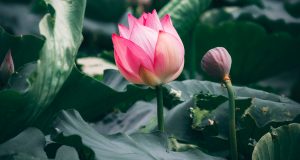By Paige Freeborn
All of those pains and resentments,
let them fall softly to the ground.
Swaying, tipping, turning like autumn leaves,
cradling their way down to the earth.
Take delight in each one,
and care for it on its journey of release,
for each one has held you steadfast on your journey.
Let these leaves of pain and resentment
rest on the earth and watch
as they magically transform into rich soil.
This is the fertile ground upon which you will grow,
rich in wisdom and confidence and beauty.
See these leaves as your growth,
each one a great teacher,
their message a part of the richness of your being.
Know that you have transformed them
into something of great value.

Throughout my eating disorder, I struggled with a pervasive sense of toxic shame: the shame that propelled the disorder in the first place; the shame of being “too weak” to stop the actions and behaviors; and the shame of not being able to speak truthfully about my mental health issues with others. The cycle of shame felt endless – a force so overwhelming that I felt powerless over it. Engaging in the eating disordered behaviours brought about temporary relief, as my body numbed to the pain I felt deep down inside. The eating disorder gave my life a focus, and the false sense that I was in control. Of course, the reality was that I was completely spiraling out of control. Self-hatred became debilitating as the eating disorder wore on, and healing became a radical act of compassion that started with forgiveness. I needed to learn to forgive myself, forgive others, and have compassion for every part of my experience, for it is only when we lovingly embrace our own suffering that we can stop the endless cycle of self-hatred and shame. Bringing to light my deepest fears, and learning to love all of the feelings and thoughts that were the manifestations of those fears, were the ingredients for my healing.
A deep pain underlies all mental illnesses and addictions and they are never, at their core, about the surface behaviours. Eating disordered people suffer with a never-ending cycle of restlessness, anxiety, and shame, and we turn to our disorder to help bring about some measure of relief. As our illness wears on, we feel less resilient, and it takes less time for us to reach the point where we engage in destructive behaviours. As we lose resilience, our bodies and minds move further away from optimum health, and our tolerance for our own suffering – and the suffering of others – diminishes. Living with an eating disorder can become a whirling vortex of despair.
After the eating disordered behaviors had ceased, I was left with a persistent sense of restlessness and anxiety in my body, and I knew I needed to explore what had been buried underneath the surface of my eating disorder. I was very disconnected from my body, and I became curious about how I could learn to inhabit it in a different way. The constant tension was unbearable, and with my usual escape mechanism (the eating disorder) no longer at play, I had to explore other options.
I started practicing meditation and yoga, and through these contemplative practices, I developed a greater capacity to sit with discomfort. With mindfulness training, we learn to sit quietly with every sensation, feeling, thought, and emotion as they arise. We learn through experience that all sensations, feelings, thoughts, and emotions inevitably pass away, no matter how intense they seem at first. Deeper into my meditation and yoga teacher training, I developed the capacity to be able to trace which bodily sensations would trigger toxic thinking. This was a fascinating exploration, and when I could witness this with non-judgemental awareness, I noticed that even the most deeply fearful and terrified states would arise, climax, and fall away all on their own if I didn’t become reactive. As I learned to come home to my body, I started befriending it, becoming curious about it, becoming in awe of it, and eventually loving it. As I learned to ride the waves of discomfort, I learned to soften into every hard edge. As I learned to relax, I became more interested in what I was experiencing, and I became more tender towards my feelings.
After years of self-compassion practice, I realized that my response to my own suffering was becoming one of kindness.
The ability to soften into my body gave me the capacity to sit with more intense forms of suffering. Eventually, I was able to sit for long stretches of time, even when I was on the verge of internal collapse. This doesn’t mean I didn’t grieve; sometimes I would weep in my meditation spot, or collapse on my yoga mat, overcome with sadness. Eventually, I developed the capacity to be able to sit calmly and create a loving space for myself, even through the most intense waves of suffering. I learned to feel my emotions fully, and to offer them a space of non-judgemental and compassionate awareness. Every time I fought with my thoughts and emotions, they would gain in intensity, and it was in these moments that I needed to show myself the most radical form of compassion. After years of self-compassion practice, I realized that my response to my own suffering was becoming one of kindness. I also came to recognize the courage it had taken to wake up every day and face the pain and exhaustion of my eating disorder.
I started developing more trust in others. It is true what they say about love: as we learn to love ourselves more deeply, we also learn to love others in a deeper way. It is only when we can sit with our own pain in a grounded way that we can also sit with the pain of others and provide them with that groundedness. Perhaps this is the greatest gift of healing: the ability to widen our circle of compassion, be comfortable with the pain of others, and understand what it means to hold space for others when they are hurting. We know how to do this because we have learned to do it for ourselves, so we are in a position to be able to offer our hard-earned wisdom to others.
 I worked with some very wise people in my recovery, who modeled what it means to create a safe, open, and loving space. I am deeply grateful to all those who supported me on my journey; they showed me what radical love and acceptance really mean. Support took many forms, including holding me as I grieved; showing patience when I tried to escape; and offering wise, timely, and constructive feedback. A powerful image comes to my mind when I remember my longtime partner sitting on the floor of our bathroom (when I was triggered and locked down in a frozen state, I would often sit on the side of our bathtub). My partner was unable to touch me or talk with me because when I was in that frozen state, my prefrontal cortex would go offline, and I couldn’t access cognition or vocabulary. I also couldn’t move or be touched. My partner would sit there for hours with me, without judging me in any way. I knew he fully loved me in those moments, and that he didn’t need me to change in any way. He also expected nothing from me in return. This open and loving acceptance was, for me, the true meaning of support.
I worked with some very wise people in my recovery, who modeled what it means to create a safe, open, and loving space. I am deeply grateful to all those who supported me on my journey; they showed me what radical love and acceptance really mean. Support took many forms, including holding me as I grieved; showing patience when I tried to escape; and offering wise, timely, and constructive feedback. A powerful image comes to my mind when I remember my longtime partner sitting on the floor of our bathroom (when I was triggered and locked down in a frozen state, I would often sit on the side of our bathtub). My partner was unable to touch me or talk with me because when I was in that frozen state, my prefrontal cortex would go offline, and I couldn’t access cognition or vocabulary. I also couldn’t move or be touched. My partner would sit there for hours with me, without judging me in any way. I knew he fully loved me in those moments, and that he didn’t need me to change in any way. He also expected nothing from me in return. This open and loving acceptance was, for me, the true meaning of support.
In order to fully heal, we must have support. Finding those who love us completely, even when we can’t love ourselves, is central to our healing. As we learn to love ourselves, we come to understand that our eating disorder was borne out of a place of deep sensitivity, and a desire to be loved. As we heal, we fall in love with every part of ourselves, even the parts we didn’t think were worthy of love. Healing means loving the dark places in ourselves, and all the parts of ourselves we didn’t think were ok. Eventually, we fall in love with every step we’ve taken along the windy road to recovery, because each of these steps has created the resilient and compassionate person we are today.
To all those suffering with an eating disorder…
May you see the dignity in your suffering.
May you realize the strength you possess, enough to bear the torture of your experience, and survive every day.
May you celebrate the courage that carries you forward into every day.
May you believe in the great rewards of recovery: more strength, deeper wisdom, and boundless compassion.
May you know that freedom and ease are possible.
May you be fully witnessed by someone who sees beyond your eating disorder and into your true, essential nature.
May you know you are already complete and whole, just as you are in this very moment.
May you let down your guard, and be truly who you are.
And may you know you are loved.
 Paige Freeborn is an artist, educator, meditation and yoga teacher, and sociocultural leader who recovered from an eating disorder over twenty years ago. She regularly works with teenagers and adults, helping them develop more self-compassion, as well as the confidence they will need to be able to be a support for others. Over the years, Paige has oriented much of her life around service. She is looking forward to becoming involved with the Looking Glass Foundation’s Hand In Hand Program.
Paige Freeborn is an artist, educator, meditation and yoga teacher, and sociocultural leader who recovered from an eating disorder over twenty years ago. She regularly works with teenagers and adults, helping them develop more self-compassion, as well as the confidence they will need to be able to be a support for others. Over the years, Paige has oriented much of her life around service. She is looking forward to becoming involved with the Looking Glass Foundation’s Hand In Hand Program.